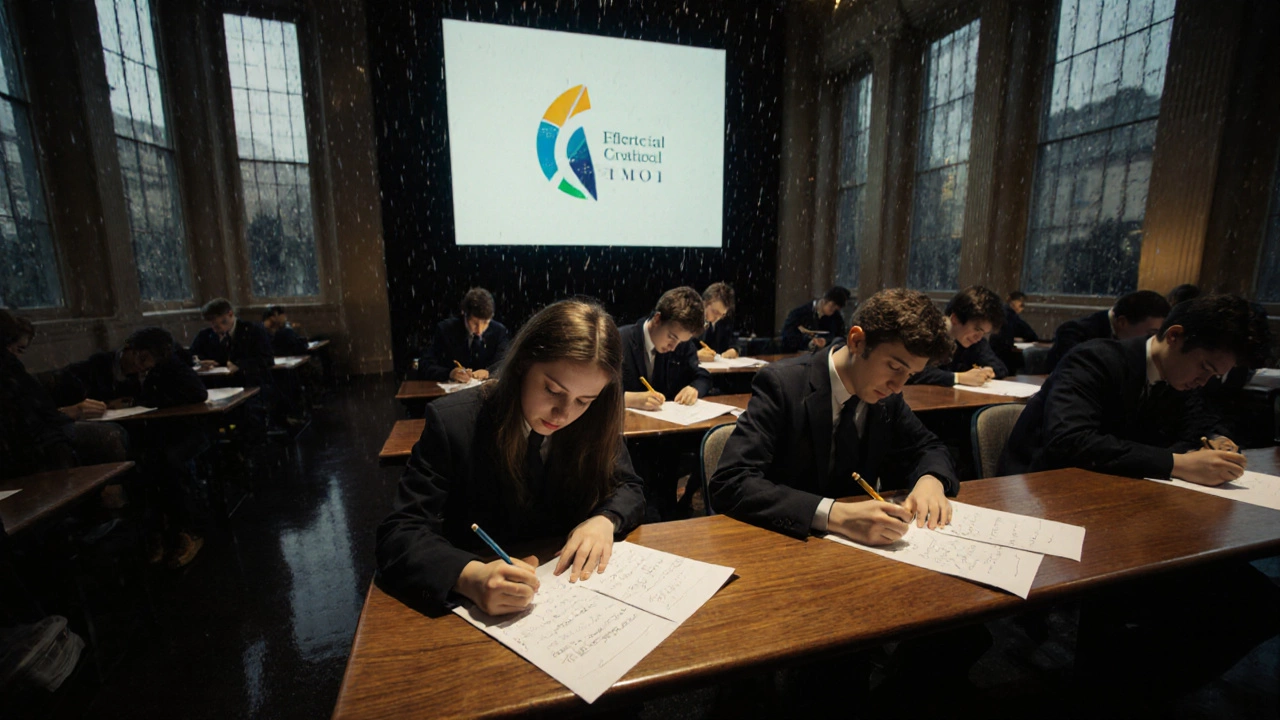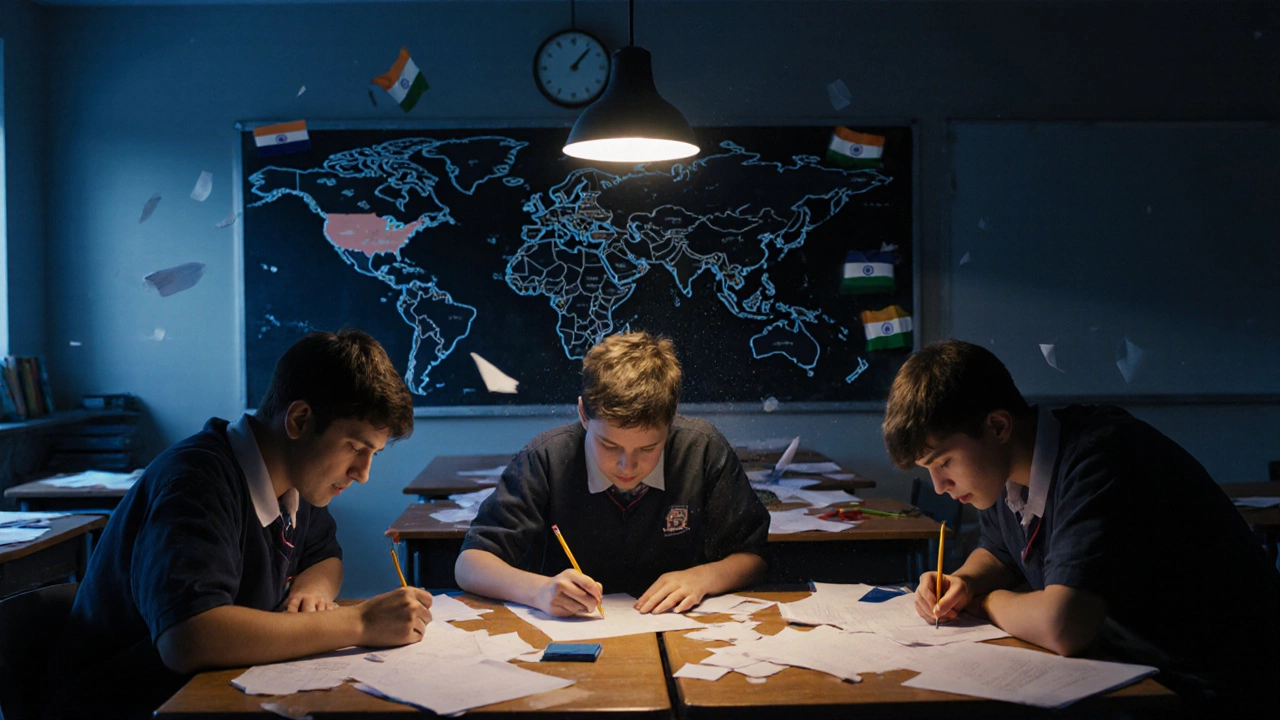When people ask about the most prestigious math exam, they’re not just looking for a test with hard problems. They want to know which one carries the most weight, opens the most doors, and is respected by universities, researchers, and math geniuses around the world. The answer isn’t a standardized test like SAT Math or GCSE Further Maths. It’s the International Mathematical Olympiad - or IMO.
What Makes the IMO So Different?
The IMO isn’t a school exam. It’s not even a national competition. It’s a yearly event where the top six high school students from over 110 countries compete in solving problems so difficult that even many university math majors struggle with them. The problems don’t test memorization. They test creativity, logic, and the ability to see patterns no one else has noticed.
Each country sends a team of six students, chosen through years of national contests. In countries like China, Russia, and South Korea, students spend hours every day training for years just to make the team. In the U.S., the path goes through the AMC, then AIME, then USAMO - and only about 50 students nationwide make it to the final selection camp.
The exam itself is held over two days. Each day, students get three problems to solve in 4.5 hours. That’s 1.5 hours per problem. No calculators. No notes. Just pencil, paper, and pure brainpower.
Why Is the IMO the Gold Standard?
Winning a medal at the IMO doesn’t just look good on a college application - it changes your life. Top performers often get full scholarships to MIT, Harvard, Princeton, and Cambridge. Many go on to win Fields Medals - the Nobel Prize of mathematics.
Take Terence Tao. He won a bronze medal at age 10, silver at 11, and gold at 13 - the youngest gold medalist ever. Today, he’s a professor at UCLA and one of the most influential mathematicians alive. His IMO experience wasn’t just a milestone. It was the launchpad.
Other IMO alumni include Maryam Mirzakhani, the first woman to win the Fields Medal, and Grigori Perelman, who solved the Poincaré Conjecture - one of the seven Millennium Prize Problems - and then refused the $1 million reward.
These aren’t outliers. They’re the rule. A 2021 study by the University of Cambridge tracked 300 former IMO participants. Over 70% went on to earn PhDs in math or related fields. Nearly 20% became university professors. That’s a success rate unmatched by any other math competition.
How Does It Compare to Other Math Competitions?
There are plenty of other tough math contests. But none match the IMO’s global reach, history, or prestige.
- Putnam Competition - A U.S. and Canada-only contest for undergraduates. Harder than most grad-level exams, but limited in scope and audience.
- Asian Pacific Mathematical Olympiad (APMO) - Regional, prestigious in Asia, but not global.
- UKMT Senior Challenge - A good entry point for teens, but multiple-choice and less rigorous.
- MathCounts - For middle schoolers in the U.S. Fun, but not on the same level.
The IMO stands apart because it’s the only one that’s truly international, judged by a panel of mathematicians from dozens of countries, and scored with extreme precision. Every problem is reviewed by multiple experts. Every medal is earned, not given.

What Do the Problems Actually Look Like?
IMO problems are famous for being deceptively simple to state but nearly impossible to solve without deep insight. Here’s an example from the 2023 exam:
Let n be a positive integer. Prove that there exists a positive integer m such that m has exactly n positive divisors and m is divisible by n.
At first glance, it sounds like a number theory warm-up. But solving it requires knowing how to construct numbers with specific divisor counts, understanding prime factorization patterns, and using modular arithmetic creatively. It’s not about formulas - it’s about seeing structure.
Another classic type: geometry problems solved without coordinates. Students must draw perfect diagrams, spot hidden symmetries, and apply theorems like Ceva’s or Menelaus’ in unexpected ways. No software. No measuring tools. Just pure reasoning.
Who Runs the IMO?
The IMO is organized by the International Mathematical Olympiad Foundation, a non-profit group based in Switzerland. Each year, a different country hosts the event. In 2024, it was held in Bath, UK. In 2025, it’s in Singapore. The host country designs the problems, but the final selection is made by a jury of team leaders from all participating countries.
There’s no corporate sponsorship. No entrance fees. No commercial branding. The IMO is run by mathematicians, for mathematicians. That purity is part of why it’s trusted worldwide.
Can You Prepare for It?
Yes - but not like you’d prep for a school test. You don’t memorize formulas. You train like an athlete. Top students solve past IMO problems daily. They study books like:
- The Art and Craft of Problem Solving by Paul Zeitz
- Problem-Solving Strategies by Arthur Engel
- 103 Trigonometry Problems by Titu Andreescu
They join online forums like Art of Problem Solving (AoPS), where thousands of students discuss solutions and post new problems every day. Many train with coaches who were themselves IMO medalists.
It takes years. Most gold medalists start competing in national contests by age 12. By 15, they’re solving problems that would stump most college math majors.

Is It Worth It If You’re Not Going to Be a Mathematician?
Even if you don’t plan to become a professor, the IMO builds skills that matter everywhere.
Problem-solving under pressure. Thinking clearly when you’re stuck. Recognizing patterns in chaos. These are the exact skills top tech companies look for in engineers, data scientists, and AI researchers. Google, Meta, and Microsoft actively recruit former IMO participants.
One former silver medalist from India now leads an AI team at a major Silicon Valley firm. He says the IMO taught him how to break down impossible problems into smaller, solvable pieces - a skill he uses every day.
The IMO isn’t just about math. It’s about training your brain to handle complexity - and that’s valuable in any field.
Final Thoughts: Why It Still Matters
In a world full of standardized tests, ranking systems, and algorithm-driven assessments, the IMO remains one of the last pure tests of raw intellectual ability. It doesn’t care where you’re from, what school you go to, or how much money your family has. It only cares if you can solve the problem.
That’s why it’s still the most prestigious math exam on Earth. Not because it’s the hardest - though it is. Not because it’s the oldest - though it started in 1959. But because it’s the only one that truly identifies the next generation of thinkers who will change how we understand mathematics - and the world.
Is the IMO only for students who want to be mathematicians?
No. While many IMO participants go into math research, the skills they develop - logical reasoning, pattern recognition, and problem-solving under pressure - are highly valued in tech, finance, engineering, and data science. Companies like Google and Microsoft actively recruit former IMO medalists.
Can anyone participate in the IMO?
Only students under 20 who haven’t started university can compete. But you can’t sign up directly. You must qualify through your country’s national math olympiad program. Each country has its own selection process, often involving multiple rounds of exams over a year.
How hard are IMO problems compared to university math?
IMO problems are often harder than first- or second-year university math courses because they require creative insight rather than learned techniques. Many university professors say they’d struggle to solve an IMO problem under exam conditions - not because they lack knowledge, but because the problems are designed to break standard approaches.
Do you need to be a genius to win a medal at the IMO?
Not necessarily. Many medalists aren’t "geniuses" in the traditional sense. They’re disciplined, persistent, and have trained for hundreds of hours. Natural talent helps, but consistent practice with hard problems is what makes the difference. Most top performers spend 10-20 hours a week training for years.
What’s the best way to start preparing for the IMO?
Start with your country’s national math competition - like AMC in the U.S., UKMT in the UK, or PRMO in India. Then work through past IMO problems and solutions. Use resources like Art of Problem Solving (AoPS) and books by Titu Andreescu. Focus on understanding why a solution works, not just memorizing it.
Next Steps If You’re Interested
If you’re a student under 20 and love math, don’t wait for someone to tell you to try. Find your country’s national math olympiad website. Register for the first round. Even if you don’t make it to the IMO, the process will make you a better thinker.
If you’re a parent or teacher, encourage curiosity over grades. Let students explore problems that don’t have obvious answers. That’s where real math - and real brilliance - begins.
